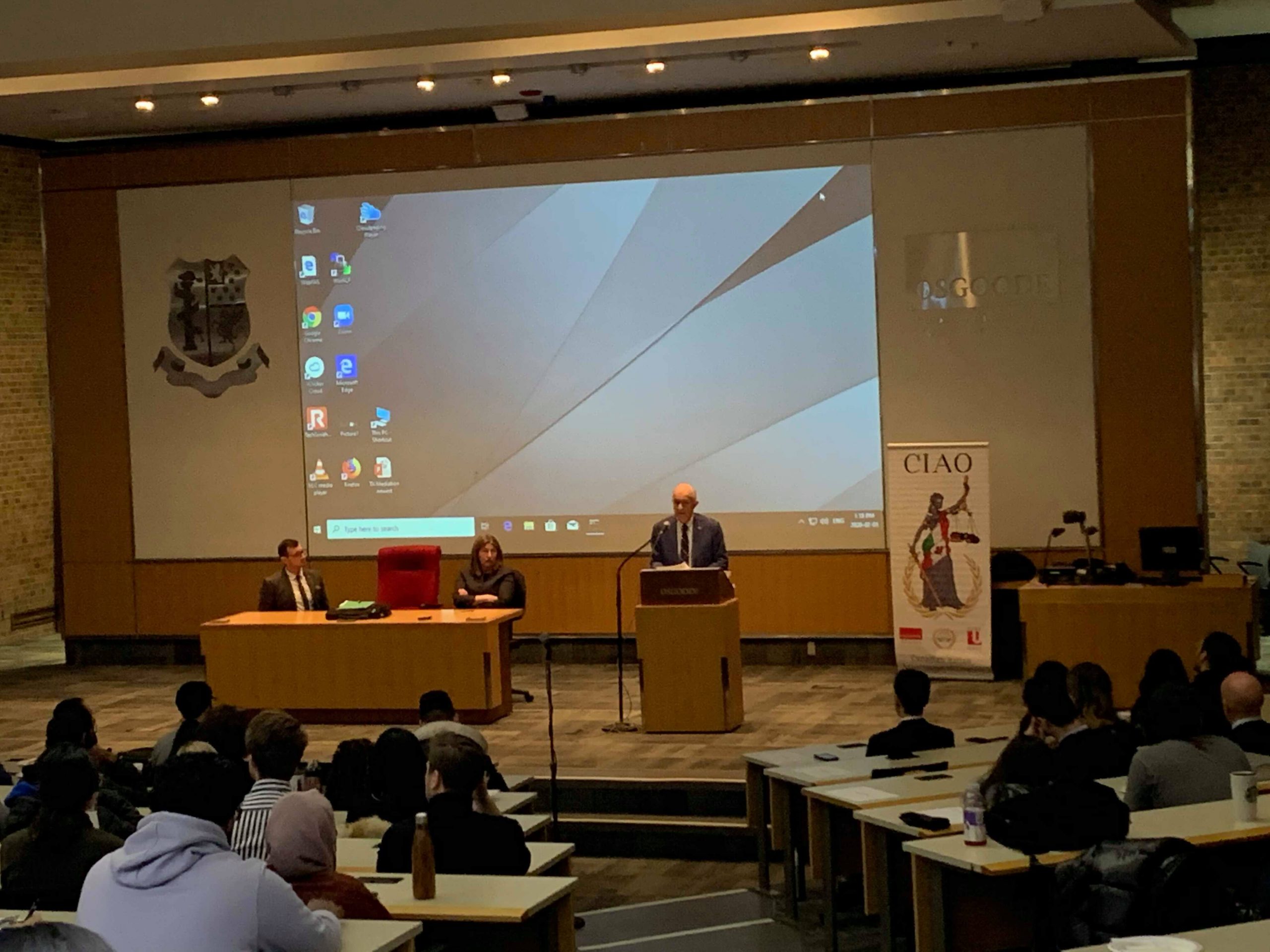Mahdis Habibinia | Executive Editor, Online
Featured Image: From left to right— CIAO President Joseph Simile, Osgoode Hall Law School Dean Mary Condon, and the Honourable Frank Iacobucci. | Courtesy of Mahdis Habibinia
On Wednesday, February 5, the Canadian Italian Association at Osgoode (CIAO) hosted the Honourable Frank Iacobucci to speak to students on his Italian-Canadian heritage, society, and the law.
Iacobucci was born and raised in Vancouver, B.C., where he received his Bachelor of Commerce and Bachelor of Laws from the University of British Columbia (UBC). He also received his Master of Laws and Diploma of International Law from Cambridge.
Iacobucci has had a distinguished career in private practice, academia, government, and the judiciary system. He has received numerous awards in Canada, the United States, England, and Italy. He retired from the Supreme Court of Canada in 2004.
When he visited Osgoode, Iacobucci spoke to a room full of law students, professors, and other York community members alike on the adversities that Italian-Canadian immigrants have faced as well as his own personal, legal journey.
The endemic and harmful manifestations of this prejudice found its way into the education system. Guidance counsellors tearing Italian-Canadian children away from university academic study and instead into trades and clerical jobs.
When Benito Mussolini came to power in 1922, Italian-Canadians were singled out as a group due to their political and business affiliations. In WWII, Italian-Canadians faced further stigma due to Canada’s allegiances. Since Italy was allied with Germany, Italian-Canadians were deemed “enemy aliens” and stereotyped as “mafiosi.” They consequently became the victims of nationwide prejudice and discrimination.
“Because of the stigma, many Italian-Canadians chose to change their names. This is not unusual. Rusicci became Ross. Riccione became Richards. And Giacomo became Jack,” said Iacobucci.
After WWII, Canada became receptive to Italian immigration and Canada saw its second big wave of Italians crossing the border. But discrimination against Italian immigrants continued, according to Iacobucci.
“The endemic and harmful manifestations of this prejudice found its way into the education system. Guidance counsellors tearing Italian-Canadian children away from university academic study and instead into trades and clerical jobs. Euphemistically labeled ‘streaming’,” said Iacobucci.
When Iacobucci said he wanted to be a lawyer, the professor responded, “You shouldn’t. You don’t have the right name.”
Second-year Osgoode Hall Law student and CIAO President Joseph Simile says that today’s ‘adversities’ would be an overstatement compared to what his grandparents endured.
“I believe that many Italian-Canadians today are still bluntly asked, ‘Are you in the Mafia?’ as if someone is a part of a gang because of their ethnicity. Or being reminded that we’re just ‘white,’ as if our culture isn’t legitimate or our ancestors didn’t face discrimination upon immigrating to this country,” says Simile.
Iacobucci related to this notion, recounting a time in 1957 when he was asked by his professor what he wanted to do in life. When Iacobucci said he wanted to be a lawyer, the professor responded, “You shouldn’t. You don’t have the right name.”
“One thing that I found particularly interesting was that the comment came from another immigrant,” says second-year Osgoode Hall Law student and CIAO Treasurer Mario Concordia.
I think this is simultaneously an example of how immigrants can have a self-limiting quality, but also how they can have the fortitude to push past it. In Justice Iacobucci’s case, it is clear that sometimes, even if there is not a clear path to success in front of you, with persistence you can clear that path for yourself,” Concordia continues.
John Deutsch, then head of the economics department at UBC, had replied to Iacobucci’s former professor with: “Canada’s changing, if this young man wants to be a lawyer, he should follow his desire.”
“But I left the office still wondering, what do you mean ‘Canada’s changing?’ Why should someone’s name have any kind of barrier to following a particular career?” said Iacobucci.
For some students, like Concordia, an important takeaway from Iacobucci’s talk was the idea that the Canadian notion of multiculturalism is insufficient by itself in a modern context. Although multiculturalism is progressive, it is interculturalism and interacting with other cultures that Iacobucci highlighted as pivotal.
Iacobucci paved his narrative from “not having the right name” to being the second ethnic Canadian to sit on the Supreme Court of Canada.
When asked what other minority groups can learn from the successful integration of Italian minorities into Canada, Iacobucci responded with the idea of interculturalism — “the more we learn about each other, the more we learn from each other.”
And the more we learn about one another, the less room there is for discrimination, unequal treatment, segregation, and alienism, added Iacobucci.
“I won’t pretend like I know the cultures of other groups. But I think that other minorities face similar challenges as a general matter.”
“We should seek out opportunities to engage with other cultures, because when we learn about those other cultures, we learn more about ourselves,” says Concordia, echoing Iacobucci’s sentiments.
Through their contributions as a whole, Italian-Canadians are among some of the individuals that have expedited cosmopolitanism in Canada over the years. And in Iacobucci’s case, he paved his narrative from “not having the right name” to being the second ethnic Canadian to sit on the Supreme Court of Canada.
“This makes me hopeful about the potential for other marginalized cultures who currently face significant discrimination. Italian-Canadians are evidence that Canadian society can change, if it is, in fact, interested in doing so,” adds Concordia.
The CIAO says that it was a privilege to provide this opportunity to the Osgoode, York, and legal community. “It took a great deal of work over many months but we feel that it is not everyday that a former Supreme Court Justice can donate their time the way Justice Iacobucci has,” states the CIAO.




